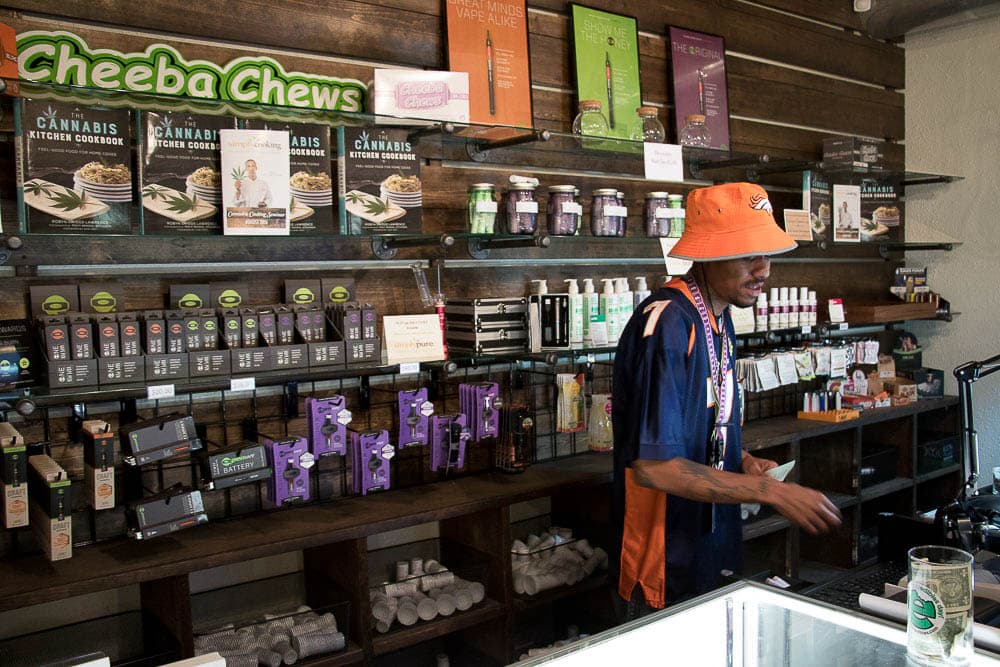
The owners of Denver's Simply Pure marijuana dispensary want to stand out in the white, male-dominated marijuana industry.
That's not hard to do considering they're among the few people of color nationwide to head a cannabis company.
Wanda James and her husband Scott Durrah became one of the first African-American couples in Colorado to own a recreational dispensary in 2015 when they opened Simply Pure in the Highland neighborhood.
The couple has experience with politics and running restaurants in Colorado and California.
"We became involved with marijuana because we wanted to put a face of color on the industry," James said. "America isn't all white and male; the industry shouldn't be either."
James and Durrah dove right in, opening an edibles manufacturing company and medical marijuana shop and launching an initiative to help set policies and regulations for marijuana all between 2010 to 2013.
Even with her background, it wasn't easy, James said. Raising money to grow and navigating the ever-changing rules about marijuana continue to be a challenge.
"If you take something that's difficult for white men to do, then imagine how much harder it is for people who are not white and women," she said.
Marijuana business owners need a lot of capital to get started, but they don't have access to the same loans and small business programs that other entrepreneurs do. Colorado also places restrictions on people with previous criminal convictions who want to work in the marijuana industry. Both of these issues hit harder for African-Americans.
James attended a congressional briefing on diversity and inclusion in the cannabis industry earlier this month to talk about issues minorities face.

Policy makers and business leaders at both the state and national levels are asking more questions about how to address the diversity problems in the growing marijuana industry. But the answers still aren't clear.
It's also not clear exactly how few minorities are in the industry, said Jesce Horton, chairman of the Minority Cannabis Business Association.
The Portland, Oregon-based association plans to partner with the University of California Berkeley this month to get diversity data on the industry, Horton said.
Horton owns Panacea cannabis dispensary in Portland and helped open the Minority Cannabis Business Association to the public in April. The organization, which focuses on economic empowerment, social justice and patient and consumer safety has about 1,000 members, he said.
"We truly believe this industry will never be as economically strong as we can be unless we really get a hold of the (diversity) issue and make an impact," Horton said.
For Horton and others, this includes addressing the fact that during the War on Drugs communities of color were targeted heavily with anti-pot messaging and enforcement.
"There's a negative stigma about cannabis in communities as a result of the War on Drugs," he said. "They don't see the benefits."
Besides getting over the hurdle of getting communities of color to see the benefits of the industry, there's also the challenge of some people being barred because of a previous marijuana-related arrest.
National crime data shows that African-Americans were arrested more often for cannabis-related crimes than their white counterparts, despite the fact that they reported using the drug less.
In Colorado, those convicted of a felony have to wait five years before applying to open a store. If that felony was drug-related, they must wait 10 years.
The same is true for those who want to work in either a medical or retail cannabis store, according to the Colorado Department of Revenue.
The Minority Cannabis Business Association has helped some people legally seal their criminal records and plans to help others moving forward. The group aims to reduce the number of people imprisoned with non-violent marijuana offenses and ensure people with non-violent marijuana offenses have fair access to the industry.

At the state level, James and others are making a similar push.
During the past two legislative sessions, they've worked with outgoing state Sen. Pat Steadman on unsuccessful legislation that would have allowed people with convictions to own or work in a marijuana business.
"For people with drug offenses on their record, it seems to me, getting them a job in the marijuana industry or letting them be an owner of a marijuana business is an opportunity that shouldn't be denied to them," Steadman said. "It's maybe one of the few places they don't face discrimination from employers because of their criminal history."
Colorado could either allow people to seal their criminal records the way Oregon does or remove the current disqualifications, Steadman said.
The Denver Democrat admits there are some people with felonies who shouldn't be involved with marijuana for safety and crime reasons.
"There are matters of degree between somebody who was importing kilos across the border and those dealing in their neighborhood among their friends to support their own habits," Steadman said.
"If we were to remove some of the current qualifications, that's not to say the licensing authorities still couldn't use discretion."
Some communities are going even further to increase diversity in the marijuana industry.
Oakland, California recently passed a measure requiring half of the medical cannabis business licenses awarded in the city to go to those formerly incarcerated for marijuana-related offenses and residents living in neighborhoods impacted most by the War on Drugs.
"I'm proud of what Oakland has done. It's a step toward understanding the problem and including communities of color," Horton said. "But the jury is still out on if it's going to work."
Business & data reporter Adrian D. Garcia can be reached via email at [email protected] or twitter.com/adriandgarcia.
Subscribe to Denverite’s newsletter here bit.ly/DailyDenverite.













